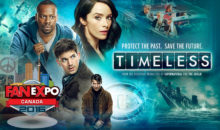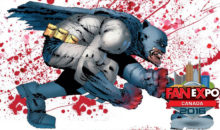Undoing The Lies Our Parents Taught Us: Stars Talk Subversive Genre Fiction At Fan Expo 2012
Subversion is not specifically about making people angry by the way. Subversion is about divesting people of lies they were taught before they know that they’re being taught lies. And these lies include “You can buy cool”, “You can buy Christmas”, “violence works”, “old people are boring”, and “gay people can’t be heroes” and we [Torchwood]were subverting that fifth lie.- James Marsters (Fan Expo Canada 2012)
Going in to Fan Expo I hadn’t anticipated “subversive” being the idea left echoing loudest in my head by the end of the four day nerd extravaganza.
It’s exciting and inspiring to be in a room and listen to actors who are involved in these heavily influential parts of pop culture speak so candidly and intently on the very real effects that these programs do have, and continue to have. Subversion has its place in pop culture, and pop culture is nothing to be taken lightly, even if “Buffy” is in the title.
James Marsters & Juliet Landau, both self-identified as subversive artists, set the tone for this idea early in their Q&A on Saturday as the pair discussed the casting process for Spike and Drusilla – hiring subversive artists to play the subversive punk rockers. Later in the Q&A a fan asked a question about what it was like playing Captain John on Torchwood. Marsters gave an excellent definition of what subversion really is, particularly when it pertains to pop culture, and genre.
Subversion is not specifically about making people angry by the way. Subversion is about divesting people of lies they were taught before they know that they’re being taught lies. And these lies include “you can buy cool”, “you can buy Christmas”, “violence works”, “old people are boring”, and “gay people can’t be heroes” and we were subverting that fifth lie.
Marsters is incredibly articulate and really captured the the positivity of subversion and punk rock as something that isn’t there to shock, but to change a world view.
Like I said before they hired a subversive to play a punk rocker on Buffy and I think that Torchwood was a very deeply subversive show.
As a subversive artist it only follows that Marsters is attracted to these kind of roles and projects. Buffy the Vampire Slayer was very groundbreaking for it’s time. In this case it’s about subverting the idea that a woman, a girl really, can’t be the hero, solve her problems and take control. A genre show, when genre was just beginning to be really taken seriously, with an empowered young woman at the centre of it can really shake the status quo when it becomes as big and influential and Buffy did, and continues to be.
I was in the back of a car going to one of these conventions with a really well known actor from the Star Wars movies who will remain unnamed. And he’s telling me why Buffy is a stupid show. Why a girl that size could never defend herself like that and I remember going to him, ‘Dude, I fight the stunt doubles for Buffy, and they’re triple black belts and they could kill both of us, it’s all about training man.’ But he’s from a different generation, that idea that a story about a female who could solve her own problems on her own and I think that at the time it was kind of revolutionary.(Marsters)
John Barrowman’s panel came the next day. Barrowman is best known for playing Captain Jack Harkness, a one time companion to The Doctor who then spun off into his own show the unmistakably, subversive, groundbreaking Torchwood. Barrowman is openly gay and very vocal about his identity, what it means to him, and speaking out for people who are not as confident, or able as he is. It is hardly surprising that much of his panel (more like performance) was informed by these themes of identity, smashing stereotypes, and celebration of queer people on TV, in the world and in the room.
Barrowman spoke at length about how with Steven Moffatt and Russell T. Davies, Torchwood is truly groundbreaking in terms of queer on TV, queer male super hero lead on television, and being out in an industry that often asks you to hide, something he obviously will not do.
A woman stood up, identified herself as a queer woman (many questioners stood up and began by identifying themselves as such) and asked John Barrowman a question. “Since genre seems to have a lot more queer characters than mainstream things…if you had any favourites out of sci-fi, comics?…” Barrowman stopped her there:
I actually have to contradict you there. Because actually the mainstream has more gay characters on television than sci-fi and sci-fi does have a lot, genre has a lot of ‘first to do its’ but it’s I don’t know things are changing people are changing…
…but the thing is and this is where I’m so proud of Captain Jack and Russell [T. Davies] and Steven [Moffat] and the BBC the fact that I’m a hero I’m not a flouncing queen , there’s nothing wrong with that, don’t get me wrong, but there’s a very diverse group of gay men and women out there and we need to be represented on television in the proper way and we don’t all need to be stereotyped on television [big cheers] and unfortunately certain cultures, audiences around the world don’t identify with types but for writers who are doing things differently and breaking those stereotypes those are the shows we should stand by and stand up for and watch. – John Barrowman (Fan Expo Canada 2012)
These conversations about being subversive, being inclusive, breaking ground and changing world views came up organically in the discussion of pop culture at these panels. It should be here, at events like Fan Expo, a gathering of fans of shows, of inspiring role models that these conversations come out. Marsters said that Buffy was about realizing that the world is a messed up place and still caring about it, one of the ways we can work to make it better is talk about these things, pop culture and entertainment are a fantastic avenue for supporting ideas and changing the world.
(feature image credit: TSE_J from the Fan Expo Canada Flickr pool)







